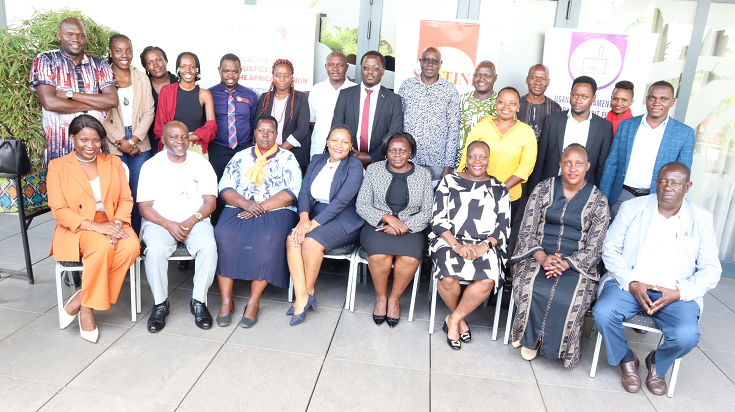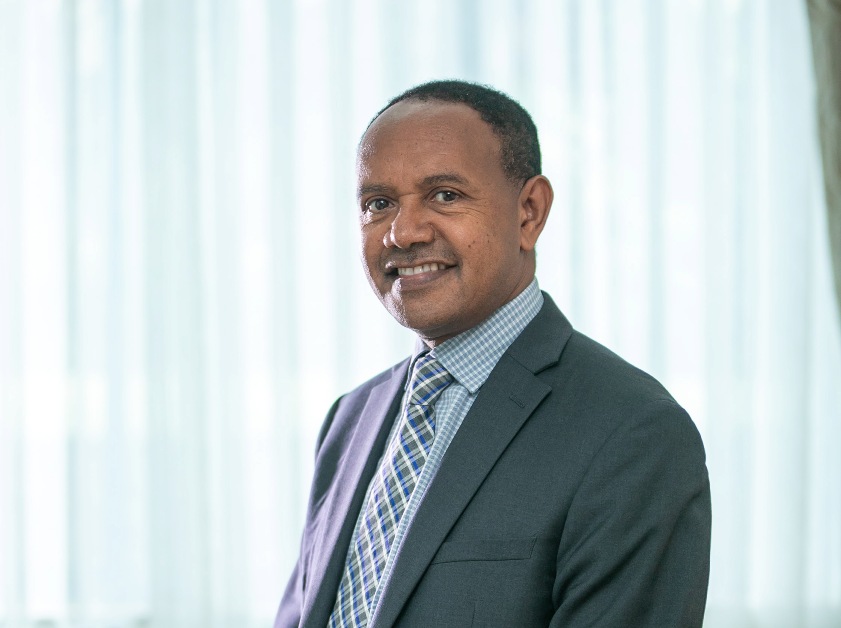MPs in a group photo with the trainers on IFFs
A team of experts have raised concerns about the institutional capacities within Government agencies charged with fighting Illicit Financial Flows (IFFs) in Uganda, despite the various laws enacted to fight the vice.
The concern was raised by Joseph Ahaisibwe, Senior Economist and Consultant during a training of MPs on the Uganda Parliamentary Network on Illicit Financial Flow held at Onomo Hotel in Kampala last week.
The training was organized by Southern and Eastern Africa Trade, Information and Negotiations Institute (SEATINI) and Tax Justice Network Africa on the impact of IFFs on National Debt and Domestic Revenue Mobilisation.
“There is weak capacities in institutions vested with the role of fighting IFFs. What capacity do they have to; detect in time some of the IFFs? The mineral and natural resource sector as one of the vulnerable sectors to IFFs, what capacity do they have in place to detect these IFFs? The Ministry of Energy should have weigh bridges, if people are moving minerals from the key mining sites, are we able to know the quantity that is being moved?,” asked Ahaisibwe.
He added that at the moment, Government depends on the voluntary declaration by the individuals to be able to assess taxes and whatever levy that is supposed to be levied, but in terms of having capacity to be able to determine what quantity, it is still a big challenge.
“Government in one way or the other hasn’t established the quantities of the natural resource that we have. And also, there are a number of unregulated activities within the mining space and also largely because of lack of capacity within Government to be able to quantify what amount of the natural resource that we have in place, so we find a number of companies manipulating some of those loopholes and they get more value perhaps in what they should have paid in terms of license,” further noted Ahaisibwe.
Mark Mutumba, International Tax Policy Analyst at SEATINI Uganda revealed that the latest studies indicate that Uganda’s vulnerability towards IFFs is alarming to the extent of around 64%, against the East African average vulnerability of 74% vulnerable to IFFs and the situation is worsened by the lack of dedicated agency to track these figures.
“That should worry all of us. Uganda ranks higher than countries that seem to be a little bit unstable like DRC. The DRC when you look at the statistics, their level of vulnerability is around 54%, South Sudan is alarmingly performing better than us. Whereas we got off the grey list, we can’t guarantee that we can’t get back because our neighbours (Kenya and Tanzania) are actually on the grey list,” noted Mutumba.
He added: “Uganda gets illicit money into the country at around US$51M, while the money we lose through profit shifting is US$79.5M and the money we lose as around corporate tax abuse ranks around US$83.9m.”
Sarah Opendi, the Tororo District Woman MP, noted that the institutional capacities are further exacerbated by the whole levels of corruption among the people entrusted with fighting IFFs, arguing that even the salary increment haven’t been in position to reduce the greed.
“It seems some of the agencies responsible seem to be overwhelmed. I think the mafias are too smart in this country, and we are failing to do what we are supposed to be doing. I thought in paying URA staff very well, people would be motivated to do the right thing. I think there is a growing cancer in this country that money seems not to be enough. Because you find public servants are paid less money, then those in agencies are paid good money, but still even when salaries are enhanced, we don’t do the right thing,” she noted.
“Not only in this sector that we are talking about, just look at doctors, we enhanced salaries for doctors, what is happening? Absenteeism, all kinds of challenges in the health sector. You go to the judiciary, where we actually had to have in place a law to ensure that these judges are actually independent, we enhanced their pay and ensured that they have safe landing after retirement, but what is happening today in the Judiciary, Oh my God! So we have a cancer and we must deal with the cancer as a country,” added Opendi.
Maurice Kibalya (Bugabula County MP) claimed that the current laws put in place to fight IFFs are instead being used to promote IFFs with avenues for the highly connected individuals escaping the wrath of the law, the same that are being used to punish the smaller people.
He noted, “We established the Financial Intelligence Authority, in my thinking, that thing (FIA) was only established to help those who are big to steal better, when they are protected and to squeeze the small ones. There is a lot of money laundering that is going on, but it is only masterminded by the big shots. The small ones are caught, and they are squeezed and they say, they are working. The big ones are ever siphoning money out of the country, doing serious ventures which is very disturbing. Stories of having laws that operate like cobwebs only to arrest small insects like cockroaches can’t work.”
The same sentiments were shared with Opendi who expressed worries of Uganda’s future noting, “But unfortunately, even with the laws in place, we are seeing completely nothing. I actually worry about the trend that we are actually taking now that even institutions that are supposed to be fighting corruption are now doing so selectively. There is selective implementation of the law and that is completely dangerous for us as a country. This is why you see, even the small people at the grassroots, everybody is thinking of how to steal funds.”
According to the UNCTAD finding of 2020, annually Africa losses an estimated US$88.6 billion to illicit financial flows (IFFs) suppressing the amounts received in Official Development Aid and foreign direct Investment.1 This staggering figure represents approximately 50 percent of the financing gap required to achieve the targets set out in the Sustainable Development Goals (SDGs).
In Uganda for instance, Approximately 32% of tax revenues are directed towards debt repayments placing a substantial strain of the countries fiscal resources.3,4Additionally, Uganda loses an estimated UGX 2 trillion (approximately $547 million) annually to illicit financial flows (IFFs), further draining critical resources from the economy. This loss is particularly alarming given the a country’s shortfall in revenue collection
Moses Aleper (Chekwii County MP), who is also Vice Chairperson the Uganda Parliamentary Network on Illicit Financial Flow remarked, “IFF is something that is coming part and partial of our financial architecture in this world. It definitely undermines the integrity of financial management in countries and in public sector. It definitely undermines some aspects of public sector management in the world.”





